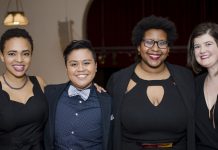
With a new leadership team of 20-somethings, the Massachusetts Commission on LGBT Youth is breathing new life
When Julian Cyr was in high school, he nearly joined the Massachusetts Commission on LGBT Youth, a state agency that advocates for vital policies and programs. Growing up in remote Truro could be tough for a young gay man. Though his parents were supportive, Cyr attended some schools where homophobia was common. Even in neighboring Provincetown, he knew, certain straight students, miffed at their town’s association with the gay community, reserved special animosity for local queer kids. But meetings in Boston proved too impractical for a teen, so Cyr put his goal of joining the Commission on hold — but he never hit “pause” on his advocacy work. The self-described “policy wonk” became a White House staffer and AIDS Support Group of Cape Cod project coordinator, and is currently deputy director of government affairs at Department of Public Health.
Now in 2013, Cyr is also the new chair of that LGBT Youth Commission — elected after a rare, spirited campaign. (Commission chairs have often run unopposed.) Cyr is 26, and his two co-chairs are also under 30. Together they form a leadership team that some members say is infusing the Commission, now long in the tooth, with a renewed sense of vitality.
“I think the election spoke more to the excitement and energy around the Commission than it did to any person, position or faction,” says Cyr, brimming with enthusiasm over the possibilities ahead. “Our job now is to capture that energy and sense of empowerment and translate it into action.”
“ Our job now is to capture that energy and sense of empowerment and translate it into action.”
Julian Cyr, newly elected chair of the the Massachusetts Commission on LGBT Youth.
And what actions are ahead? Cyr says that research indicates the Commission must make especially important inroads addressing the unique needs of transgender youth and queer youth of color. Promoting policies and programs that impact these populations is paramount, says Cyr, and so is ensuring that the 50-member agency reflects greater diversity. He says that including commissioners of all ages from urban, suburban, and rural parts of the state alike is vital to building a representative body.
That perspective heartens Gunner Scott, an influential transgender activist who has served on the commission since 2007 but stepped down following Cyr’s election. That was, he says, a vote of confidence.
“Leaving the commission now is an endorsement that I believe in the folks that are taking leadership,” says Scott. He says previous chairs imposed a hierarchical approach that made it difficult for a variety of voices, particularly those of LGBT youth, to be heard on the Massachusetts Commission of LGBT Youth. “They were not very connected to the youth community. There was a wide divide,” says Scott.
Of course, every aging state agency needs an added shot of oomph now and then, and the Commission on LGBT Youth is no exception. After all, it was founded amid enough drama to put grays on anyone’s head. The agency started in 1992 as the Governor’s Commission on Gay and Lesbian Youth, Governor William Weld’s response to youth-related issues like anti-gay harassment and suicide. It was the first commission of its kind in the country, and its power expanded in 1998 under Governor Paul Cellucci. Suicide prevention programs, “safe school” administrator trainings, GSA support and more all flourished under the early commission.
But in 2006, Governor Mitt Romney almost hastily dissolved the commission in anger after it issued a Youth Pride press release on stationery that included his name. Emergency phone calls from political allies averted that catastrophe, but a lesson was learned about entrusting the commission’s existence to any one elected official. So the legislature hurriedly created the current incarnation of the Massachusetts Commission on GLBT (now LGBT) Youth, which exists independent of the governor’s office. In this form the commission is safer from the whims of an inhospitable executive, but even its members admit that the rushed nature of the reorganization made things a challenge.
“In many ways we had to figure out how to be a legislative commission. I think there was a period of just finding out the best infrastructure,” says Grace Sterling Stowell, executive director of Boston Alliance of Gay, Lesbian, Bisexual, and Transgender Youth (BAGLY). Stowell was a founding member of the Governor’s Commission in 1992; in the agency’s current incarnation she occupies a seat appointed by the Massachusetts Lesbian and Gay Political Caucus, one of 27 community organizations that now have appointing powers.
It took time to recalibrate the infrastructure of a commission with such a broad mission, says Stowell. “In some ways we’re twenty-one years old; in other ways we’re only six or seven,” explains Stowell. “We weren’t given much guidance or bylaws, and like any new coalition there were challenges in figuring things out. I think we will be much more efficient going forward.”
As executive director of a youth-led organization, Stowell is also excited about the new Commission chairs. She agrees with Scott that the agency has wanted for youth perspectives. “With all the leadership positions being people under thirty, it’s exciting to me that the commission is being proactive in representing young people,” says Stowell. “We live in a world that’s set up for adults, and it’s challenging for young people to participate in governmental bodies like this.”
While engaging youth is important, it’s vital to remember that the agency is not intended to be a youth development organization, says former Commission chair Arthur Lipkin. Lipkin has extensive experience working on LGBT youth issues: from directing the Governor’s Commission’s Safe Colleges Program to teaching the first course on LGBT school issues at the Harvard Graduate School of Education. He has also authored two books on LGBT issues in educational settings, and taught in Cambridge Public Schools for 20 years. Lipkin hopes commissioners will continue to view the agency as adult-run and youth-advised, not the other way around.
“I recognize how much work it takes to have a youth-led, adult-organized structure, and I don’t feel the Commission can be that,” says Lipkin. He says soliciting guidance from youth members is important, but that the Commission should keep its focus on its marching orders: to provide recommendations for resources, policies, and programs that improve the lives of LGBT youth across the state. “My primary position is that although we are very much in touch with youth, our primary goal as a commission is not the positive development of our youth members — it is the positive development of youth across the state.”
To that end, says Lipkin, he prioritized research initiatives throughout his tenure. “When I became chair, the state just didn’t have the money to invest in evaluation and research. They were focused on provision of services, and weren’t able to find the wherewithal to do the stuff that might improve those services in the long run.”
So Lipkin initiated partnerships with institutions like Harvard University, Boston College, and Fenway Institute. These collaborations yielded a number of research initiatives, including an 11-year grant to study the impact of community-based support programs on the health of LGBT youth of color; a grant to study the goals and effectiveness of the Massachusetts GSA system; and the creation of an interactive geo-map of clinical and support services for LGBT youth across the state. Under Lipkin’s chairmanship the Commission also held 20th anniversary public hearings, where adult and youth speakers on topics like homelessness, bullying, and legal system discrimination helped the Commission assess the current needs of LGBT young people and make its Fiscal Year 2014 recommendations to various state departments. These recommendations stressed everything from the importance of LGBT cultural competency training for state employees, to the value of collecting data on sexual orientation and gender identity to gauge the efficacy of programs.
The Commission even researched itself, in a way; it used a grant from The Boston Foundation to hire a consulting firm that made recommendations for future planning.
Research isn’t glamorous, and it doesn’t always provide the sense of momentum that program development does. But Lipkin says it is vital. After all, how can the agency recommend policies without understanding problems? How can it suggest new programs without knowing the effectiveness of those that already exist? “I don’t fault the people in the trenches for not being able to step back and take that perspective,” says Lipkin. “They are putting out fires every day. They have kids coming to them who have no home, who are dealing with family rejection, HIV, and STDs.”
“But the commission is not providing direct services, so we are in the perfect place to be studying these issues.”
Turning research into action is where the Commission will head, says new chair Cyr. For instance, he says, the valuable research has elucidated the disparities that exist around issues of health and homelessness for transgender youth and LGBT youth of color. Now it’s a matter of translating recommendations into action; and one first step has been developing liaison relationships between Commission members and specific state departments. Fostering those connections is what will take thorough but highly academic recommendation reports off “to-read” lists and put them on “top priority” agendas.
Besides research and action, there’s another balance that must be struck. “Over the last few years we’d have plenty of conversations around adultism, which says ‘You’re too young to do this,’” says Cyr. He has nothing but admiration for older commissioners, and says that ageism won’t be tolerated either. “We can’t be saying to people who have been doing this for twenty years, ‘Step out of the way and let the new kids do it!’” promises Cyr.
Step out of the way? No. But prepare to make room. [x]
Massachusetts Commission on LGBT Youth
www.mass.gov/cgly








